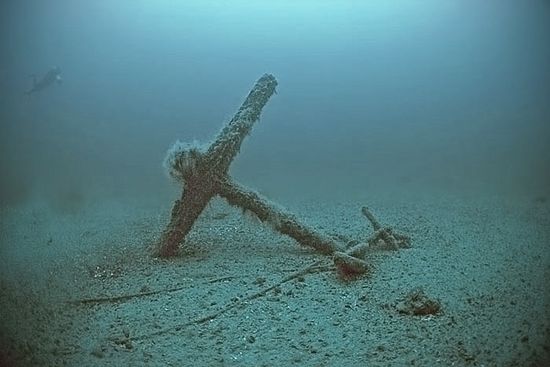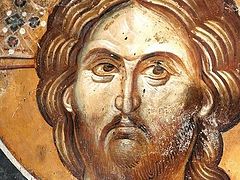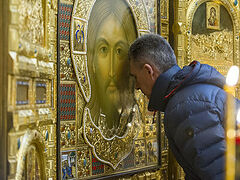 The word of St. John Climacus on humility begins as though many spiritually experienced people had gathered together, and each explains what humility is in his view:
The word of St. John Climacus on humility begins as though many spiritually experienced people had gathered together, and each explains what humility is in his view:
We have met, we have investigated, and we have probed the meaning of this precious inscription [of “Holy Humility”]. And one said: “It means constant oblivion of one’s achievements.” Another: “It is the acknowledgement of oneself as the last of all and the greatest sinner of all.” And another: “The mind’s recognition of one’s weakness and impotence.” Another again: “In fits of rage it means to forestall one’s neighbour and be first to stop the quarrel.” And again another: “Recognition of Divine grace and Divine mercy.” And again another: “The feeling of a contrite soul, and the renunciation of one’s own will.”
So, one said that humility “means constant oblivion of one’s achievements.” That is, when we do some good deed—a spiritual podvig or virtue, we should always forget about it, not remember it, not go back, and not look back to it: “See! I’m fasting, prostrating, keeping vigil, and giving alms!” That is, having accomplished some spiritual deed, we must leave it behind us, because the mere fact that our mind goes back and looks at what we have done is a sign of an unhealthy person and unhealthy humility.
Unfortunately, many people come to Confession, which is a Mystery that contributes to attaining humility, and instead of listing their sins, they list their virtues, beginning:
“I do good deeds, Father. I do this good thing, and that good thing!...”
They talk like Confession is the confession not of your sins, but of virtues! I want to believe that this stems from spiritual naivety, spiritual impotence; that is, they’re not doing this intentionally—it’s just a sign of the absence of the spirit of humility, which would regard our good works as nothing. And they really are nothing, for whatever we do, it’s all nothing if the grace of the Holy Spirit doesn’t perfect, fill up, and sanctify our works. God can’t be bought—nor grace and the eternal Kingdom—with our deeds and our own efforts. Our works are but our contribution to grace.
Another said that humility “is the acknowledgement of oneself as the last of all and the greatest sinner of all.”
This is also humility. It’s a great work to realize that you are the most sinful of all people, of all creation. But what a strong spirit we must have to say such a thing today—not as when St. John Climacus wrote his famous work, when “psychopathy” wasn’t so widespread as today, when, unfortunately most of us suffer from it in some form, and therefore a humble spirit is unbearable for us.
I notice with myself, and with the brethren in general, with those who are beginning to labor in asceticism, how easily people break down when they want to acquire a humble thought. Unfortunately, the human soul can’t endure today; it lacks the strength to endure humble thoughts, and instead of remaining within the framework of healthy humility, it’s captured by a thought saying: “I’m the worst, I’m the most sinful of all!”—and then it’s damaged. Instead of becoming an incentive for spiritual struggle, hope, spiritual sorrow, fervent prayer, seeking God’s grace, and strengthening, the thought serves as impetus for the fact that this man is dying, falling, as if disappearing into the abyss.
Such people should also be reminded: “No, it’s not a sin, you’re not sinful. You’re very good. You have so many virtues!” so that they could get on their feet a little, because they’re like a man who has fallen into the abyss, who is completely broken and can’t get up. Therefore, we must have great discernment in relation to this thought that tells us that we are the last and worst of all. Of course, we are weak, cursed, and more sinful than all, but we mustn’t humiliate ourselves lower than we can stand. Because as a result, we are psychologically traumatized, and instead of being soul-saving, this Patristic advice leads to mental illness (psychopathy).
This is a very delicate point. Therefore, if someone sees that these thoughts discourage him and plunge him into spiritual darkness and despair, he must flee from them, encourage himself, and even recall his supposed virtues—in order to have boldness, because despair is a perfect death, complete hopelessness; it is truly a death sentence for the soul.
A Christian should never fall into despair. It’s better to fall into vainglory than despair, because in vainglory, so to speak, a Christian gets ready to become pious, to do good works, while in despair, he breaks down and completely surrenders himself to spiritual darkness and death. Therefore, we must always consider ourselves the most sinful of all, but always with the hope that even if we are, God’s mercy is omnipotent and God’s love is so abundant that it covers our sinfulness.
The third said that humility is “the mind’s recognition of one’s weakness and impotence.”
In other words, it means knowing yourself. This is also humility, that is, it means accepting yourself. This is a big problem today. People come and torment themselves:
“Why do I think such bad things? Why do I have this or that thought? Why do I have such feelings for others? If I think this way, it means I’m dead! I can no longer be saved; I’m good for nothing!”
“Why wouldn’t you try to think about it differently? Don’t you know that you’re human?”
“I know that.”
“Don’t you know that you have human nature, damaged by the Fall?; that you bear within yourself all the disease that we inherit from Adam after the Fall?”
“I know that.”
“So why do you despair when you see within yourself impure and blasphemous thoughts about another, thoughts of envy and malice? All of this malice excites and often plunges you into passions and sins. Do you really not know this? So then why are you indignant? Don’t you understand that this is your own disease?”
That is, how can I explain it to you? We don’t want to accept the fact that we’re weak; we don’t accept our own selves!
It’s a great thing to understand that this is me! It’s me who gets angry, who shouts, who gets nervous; it’s me who’s gluttonous, impure, and whatever else. When we agree that we’re like this, and understand it without painful reactions, then we’ll be able to pray with great spiritual sorrow, showing God this disease of ours. This is the right path.
I understand that I’m unclean and cursed, and I always fall at the feet of God, at the feet of Christ, and in great sorrow I prayerfully confess my sickness and seek God’s mercy. I understand and believe that it is God Who will have mercy upon me—not my virtues, not my accomplishments, of which there are none. They don’t exist now and never will.
It’s very important. We modern people suffer a lot because we don’t want to accept ourselves as we are. So we don’t accept ourselves, but at the same time, we constantly ask ourselves: “Why, why, why?” And this endless why (“Why do I think this way? Why do I do this?”) is a sign of egotism and our lack of humility.
As a result, we fall into a vicious cycle of spiritual illnesses and psychological torments. In the end, we torment ourselves and others, but we don’t get the fruit, because we don’t want to understand that we’re weak people. But when we understand this, we humble ourselves, that yes, in the end, this is who we are.
We’re like that first-grader who wants to take and read some kind of scientific treatise and weeps, screams, and shrieks, demanding that we explain to him what the word “aerodynamics,” for example, means. How can you explain it to him? He can’t understand it. And you tell him:
“Everything will come with time, when you grow up…”
“No! I want you to explain it to me! Right now! Explain it to me so I’ll know!”
Or he wants to read in English, for example, or in Chinese. If you haven’t learned it yourself, how can you teach him?
It’s just as absurd when a man persists in his desire to achieve spiritual states before their time. Is it possible to have concentrated prayer when we’re still spiritual beginners? Is it really possible for our mind not to be dissipated? And when do we go to church without having carnal thoughts, without being envious of other people or getting angry, without someone making us angry, or without having thoughts of revenge when we’re treated unfairly?
Unfortunately, all of these are natural phenomena after the Fall—this is how our nature functions. But we accept, we acknowledge our sickness and we hope in the boundless mercy of God. When we fixate upon our infirmities and this egotistical impatience takes hold of us—“Why?” and “How?”, “We haven’t done anything good at all,” “We’re nothing!” and so on—then we don’t even let God help us.
Often, God wants to help us, but He can’t, because we don’t allow Him to draw near to us, to bring peace to our souls. We resist and close all doors to God in advance.
Therefore, according to St. John Climacus, we must know our illness and infirmity well, realize and accept it, and say: “This is how I am, and I throw myself before God as I am”—then and only then will you be able to find peace of soul.
Often, when a man suffers from carnal infirmity and can’t seem to deliver himself from it, he tells himself: “Am I supposed to pray? And how will I pray after I sin and fall into fleshly sins! I won’t pray! I won’t go to church either, since I do such things. I don’t read spiritual books for the same reason; I don’t confess,” and so on. In the end, what happens? What’s happening is that if before satan needed 500 bullets to destroy us, now he’s doing it with just one.
Such a man needs to hear:
“Good, child! You can’t beat this passion, right? The passion itself defeats you. But is your entire life, your whole personality really just this passion? Isn’t there anything else about you? Can you really not love someone else, not pray, fast, keep vigil, and go to church? Okay, so you have this passion. Isolate it, accept the fact that you have this passion, and prostrate yourself before God, remembering the other parts of yourself. Only in this way will you find healing from this passion.
If you fall into despair and cling to this particular problem and get stuck in it, then (according to the metaphor of the elders of the Holy Mountain, describing how such people drown) you’ll be like a man in a shipwreck: The ship breaks apart into boards, everyone grabs a piece of wood, but only you hold onto the anchor and sink with it. They exclaim: “He grabbed the anchor!” That is, instead of grabbing a board, he grabs the heaviest part of the ship and sinks.
And the question is: Were there really no boards left? Is there really nothing more for you to fight for? Are you going to drown, stuck on this anchor?
Ultimately, what does this mean? It’s a sign of a lack of humility, a symptom of egotism—painful egotism. Why can’t you accept that you’re weak, which is what you are? Go to Christ and say: “Lord, I am the way I am. I’m physically unclean, I’m cursed, thrice over, but I want to be with Thee!” So said the harlot, the Canaanite woman, the thief, the publican—everyone. They brought their sins to Christ.
In one story about St. Jerome, who loved Christ so much, it says that at the All-Night Vigil on Christmas Eve, he prayed and said: “My God, what’s being sung in today’s troparion? The angels offered Thee a hymn, the Magi—gifts, the shepherds came to see Thee, the earth—a cave, the heavens—a star, but me? What can I offer Thee? What?” And when he prayed like this, he had a Divine vision. He saw Christ in the form of an Infant before him and said to Him:
“My God, what wouldst Thou that I offer Thee?”
And he heard in response:
“Your sins!”
This is what God wants—for us to give Him our sins, for Him to whiten and cleanse them, for Him to cleanse us.
It’s like when we go to the doctor, we do what he wants us to do. And he says:
“Let me examine you.”
Of course, you don’t go to the doctor to talk about politics. You go with a specific goal—for him to examine you, because you’re sick. God does the same thing. He receives a man who is sick and wounded by sin and heals him. As long as we don’t behave like reckless people and don’t resist and raise a hand against the doctor for wanting to touch our wound and heal us.
This process begins with the awareness of the disease, that is, with the understanding that we are weak people. But we have to understand this correctly—with hope and strength, which we draw precisely from the experience of God’s boundless love.
And another said that humility is the “recognition of Divine grace and Divine mercy.”
That is, that you recognize that God is merciful, that He abundantly pours out His grace on the entire world, and that the grace and mercy of God support us all. And this is humility—not thinking that you’ll do everything yourself, that you’ll fix everything yourself, and that everything depends on you.
People often come and say, for example:
“What should I do with my child?”
You answer:
“Do this and that and pray, my child, and may God cover him with His grace!”
But he insists:
“Yes, okay, but tell me what else I should do? What else?”
Such a man believes that his actions will save the child. We tell him about prayer, and he basically rejects it, because he thinks that God and prayer are nothing.
We actually consider our actions so important that we think no one will benefit in any way without them. And what happens in the end? If we come to understand that God rules creation, that God is the beginning of all and is Father to us all, and that if He doesn’t help us, then even if we call upon all the forces of the world, all the worldly education, authority, and ingenuity, we’ll still do nothing—then we’ll realize how great is the power of prayer and how much we need prayerful communion with God.
We’ll understand this when we realize that ultimately God’s grace and mercy are a seal on our deeds. When we realize this, then we understand the power of prayer and the poverty of our thoughts, achievements, and works. Then we find peace and we say:
“I did what I could, and may the All-Good God do the rest from here!”
Otherwise, we’re consumed by anxiety, and we seek a way to overcome it, trying to do something to benefit others. And what happens as a result? These people don’t hear what we’re telling them: You show them one way, and they immediately throw it away it and seek another. You show them a second way, and they seek a third, a fourth… a tenth, and so on. So what are they really looking for? If there was some way to magically change everyone, they would immediately make use of it.
And they say:
“Doesn’t God have the power to change others? Why doesn’t He change them?”
Because God respects the freedom of others and doesn’t worry, doesn’t panic like you do, because God sees everything before Him—the past, the present, and the future—everything.
God isn’t afraid, so don’t you be afraid either. Fear means a lack of humility, and that is a sign of a lack of faith.
To be continued…





